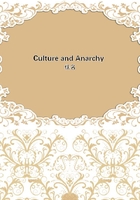
第18章
Children of God,--it is an immense pretension!--and how are we to justify it? By the works which we do, and the words which we speak. And the work which we collective children of God do, our grand centre of life, our city which we have builded for us to dwell in, is London! London, with its unutterable external hideousness, and with its internal canker of publicèegestas, privatim opulentia,--to use the words which Sallust puts into Cato's mouth about Rome,--unequalled in the world! The word, again, which we children of God speak, the voice which most hits our collective thought, the newspaper with the largest circulation in England, nay, with the largest circulation in the whole world, is the Daily Telegraph ! I say that when our religious organisations,--which I admit to express the most considerable effort after perfection that our race has yet made,--land us in no better result than this, it is high time to examine carefully their idea of perfection, to see whether it does not leave out of account sides and forces of human nature which we might turn to great use; whether it would not be more operative if it were more complete. And I say that the English reliance on our religious organisations and on their ideas of human perfection just as they stand, is like our reliance on freedom, on muscular Christianity, on population, on coal, on wealth,--mere belief in machinery, and unfruitful; and that it is wholesomely counteracted by culture, bent on seeing things as they are, and on drawing the human race onwards to a more complete, a harmonious perfection.
22 Culture, however, shows its single-minded love of perfection, its desire simply to make reason and the will of God prevail, its freedom from fanaticism, by its attitude towards all this machinery, even while it insists that it is machinery. Fanatics, seeing the mischief men do themselves by their blind belief in some machinery or other,--whether it is wealth and industrialism, or whether it is the cultivation of bodily strength and activity, or whether it is a political organisation,--or whether it is a religious organisation,--oppose with might and main the tendency to this or that political and religious organisation, or to games and athletic exercises, or to wealth and industrialism, and try violently to stop it.
But the flexibility which sweetness and light give, and which is one of the rewards of culture pursued in good faith, enables a man to see that a tendency may be necessary, and even, as a preparation for something in the future, salutary, and yet that the generations or individuals who obey this tendency are sacrificed to it, that they fall short of the hope of perfection by following it; and that its mischiefs are to be criticised, lest it should take too firm a hold and last after it has served its purpose.
23 Mr. Gladstone well pointed out, in a speech at Paris,--and others have pointed out the same thing,--how necessary is the present great movement towards wealth and industrialism, in order to lay broad foundations of material well-being for the society of the future.
The worst of these justifications is, that they are generally addressed to the very people engaged, body and soul, in the movement in question;at all events, that they are always seized with the greatest avidity by these people, and taken by them as quite justifying their life; and that thus they tend to harden them in their sins. Now, culture admits the necessity of the movement towards fortune-making and exaggerated industrialism, readily allows that the future may derive benefit from it; but insists, at the same time, that the passing generations of industrialists,--forming, for the most part, the stout main body of Philistinism,--are sacrificed to it. In the same way, the result of all the games and sports which occupy the passing generation of boys and young men may be the establishment of a better and sounder physical type for the future to work with. Culture does not set itself against the games and sports; it congratulates the future, and hopes it will make a good use of its improved physical basis;but it points out that our passing generation of boys and young men is, meantime, sacrificed. Puritanism was perhaps necessary to develop the moral fibre of the English race, Nonconformity to break the yoke of ecclesiastical domination over men's minds and to prepare the way for freedom of thought in the distant future; still, culture points out that the harmonious perfection of generations of Puritans and Nonconformists have been, in consequence, sacrificed. Freedom of speech may be necessary for the society of the future, but the young lions of the Daily Telegraph in the meanwhile are sacrificed. A voice for every man in his country's government may lie necessary for the society of the future, but meanwhile Mr. Beales and Mr. Bradlaugh are sacrificed.